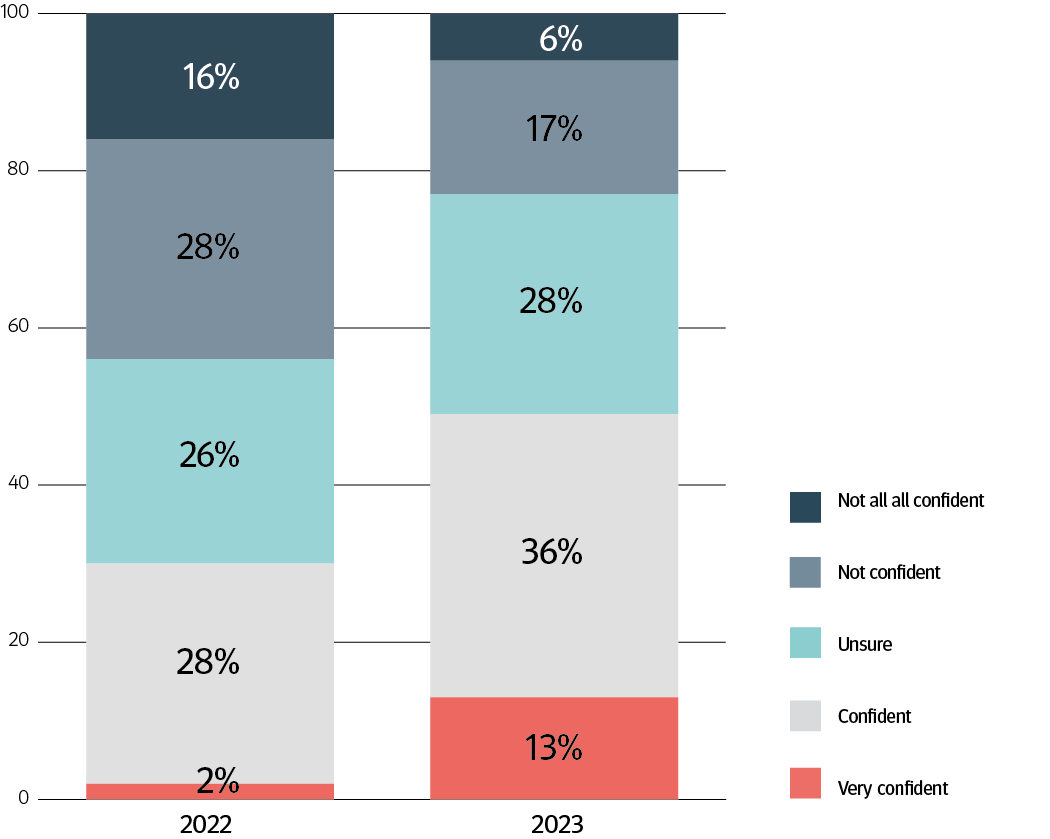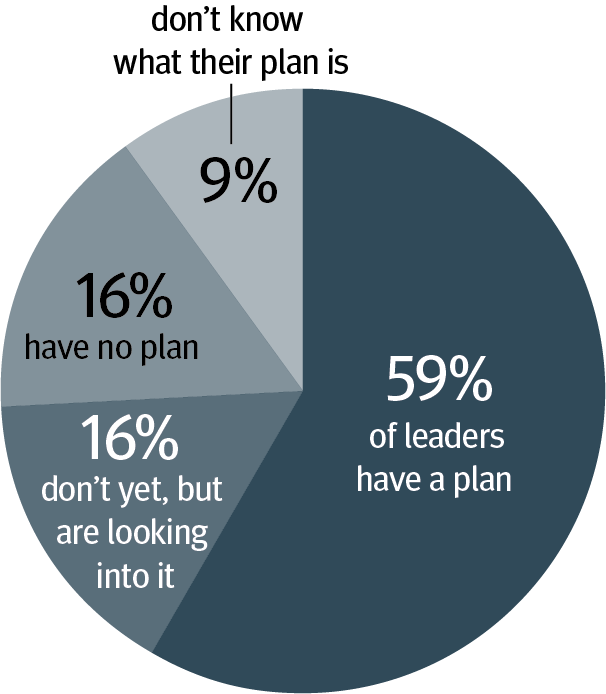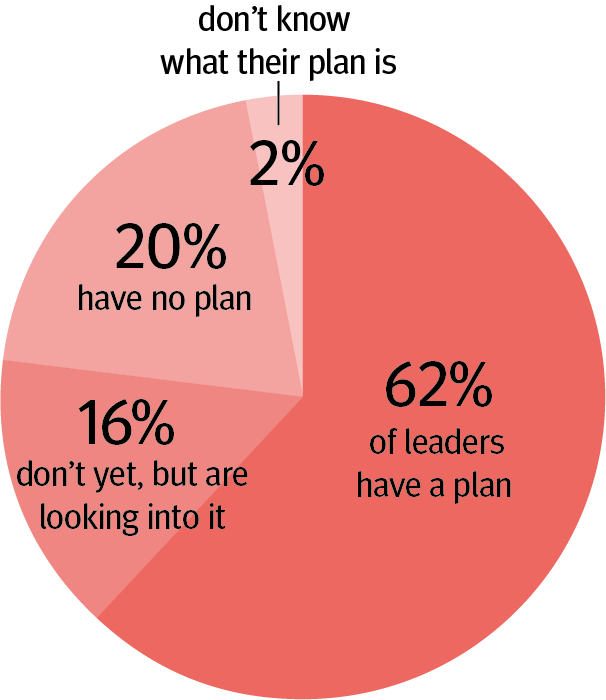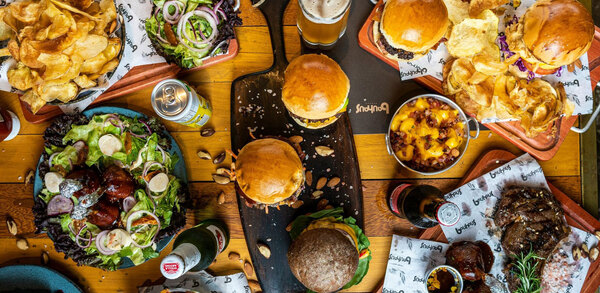How hospitality’s business leaders are tackling recruitment in 2024
The staffing crisis may be easing slightly, but it will take a huge collective effort from the industry to recruit in 2024, according to the Hospitality Business Leaders Survey. Emma Lake reports
Confidence in the labour market has increased substantially among hospitality business leaders in the past 18 months. The Hospitality Business Leader Survey 2023, produced by The Caterer and CGA by NIQ, found the number of business leaders predicting labour sourcing would be a very significant issue in the next 12 months fell to 65% from 81% the previous year.
While confidence is clearly building, there’s no sign that the problem is disappearing. A further 28% of leaders said recruitment would be a significant issue, with just 7% anticipating no difficulties in recruiting.
Andrew O’Callaghan, people director at restaurant group Dishoom, confirmed he has noticed an improvement in the labour market, particularly in London, where the group had struggled to recruit in early 2023.
He says: “We were finding recruitment incredibly difficult in the first half of last year, but from the second half of the year it’s become much easier. We now start the week with a 2% vacancy rate and back then it could have been a 10%-15% vacancy rate on a bad week. Outside of London we’ve found it much easier, even since Covid. We do particularly well with team recommendations [outside of the capital].”
The Hospitality Business Leader Survey showed that concern about recruitment was more acute among hoteliers, with 71% describing labour sources as a very significant issue. Emma Bellwood, HR director at the Grand, York, confirms that recruitment in the city continues to be difficult. Accordingly, the hotel has looked to access alternative talent pipelines and focused on retention, recording its lowest ever turnover rate of 31% in the last reported year.
She says: “When we do have an opportunity to recruit, our strategy has been to be a positively inclusive employer. We have partnered locally with community partners and charities to break down barriers for people further away from the employment market. For example, we work with our local women’s open prison; people who have left the care system and we take up every Department of Work & Pensions initiative that comes our way. We’re open to everyone from every place in the world, every economic area and every background – there’s a job for everyone.”
Sourcing strategies
While leaders anticipate labour shortages being a significant issue for the wider sector, 49% said they were confident in their own ability to recruit, retain and train. This was a stark increase on 31% in the previous year.
It’s set to be a busy time for the employment market, with 94% of leaders anticipating recruiting staff this year and 20% predicting they will need to recruit to a greater extent than in previous years. Again, this figure was slightly higher among hoteliers, with 96% planning on recruiting this year.
While there are signs of improvement, labour shortages are still hindering the sector’s growth and in April MPs launched an inquiry into the issue of staff recruitment and retention in the hospitality industry.
The number of unfilled hospitality roles has remained steadily above 100,000 since the start of the pandemic in 2020. There were 112,000 vacant hospitality jobs at the end of 2023, according to the Office for National Statistics (ONS), up from 89,000 before the pandemic.
In light of the challenges of recent years, it’s unsurprising that retention has become ever more important. Both Bellwood and O’Callaghan stress the importance of creating a culture that embeds staff into the business. That begins from the moment they apply for a job and continues throughout their employment.
Dishoom has a team member in every site dedicated to onboarding colleagues and supporting their training. Every recruit also attends an initiation with the restaurant group’s founders Shamil and Kavi Thakrar.
O’Callaghan says: “We place a big emphasis on showing people what we want the business to be. We have a mantra that while the business grows, we want to deepen what we do, not dilute it. To do that we need to have a culture that’s identifiable and consistent. We want to be big-hearted and generous in everything we do throughout the business and if we weren’t big-hearted with how we treat our teams on a day-to-day basis, how could we possibly say and do that?”
Both businesses have introduced initiatives to support their teams’ physical, mental, financial and social wellbeing. Dishoom has launched a savings programme for its employees as well as having all managers undertake mental health training. It provides access to an employee assistance programme and launched a fitness tracker where employees can share their updates.
At the Grand, initiatives have included the establishing of Sue’s Shop, where staff can buy essentials such as toilet roll and washing powder at cost price. It has also given access to discounted bus travel, provides breakfast, lunch and dinner for team members and has a hardship loan scheme.
Bellwood adds: “We really look after people when they’re here. If anybody is in need, we all rally around and that comes from the top. We’ve recently done an engagement survey and one of the questions was: ‘What makes it a great place to work?’. I felt so proud reading the responses about it being a family and people feeling they were nurtured, cared for and understood.”
Outside of improving retention, Bellwood is clear about the impact this focus has on the wider business. She adds: “It reflects on our guest scores, as anyone who walks in the building feels it’s a good place to be. The team and culture are reflective on the guest experience.
“Guest scores last year were the highest they’ve ever been. We had the lowest turnover, the highest team engagement, the highest guest scores and the highest revenue of the 12 years the hotel has been open.”
Money talks
Pay has been an area where hospitality has traditionally had a troubled reputation and a salary survey by Access Hospitality found that 37% of those working in the sector earn a salary of £30,000 or less, compared with 30% in 2023. However, when it came to pay and conditions, 51% of leaders considered their businesses market leading and 49% said they felt they were in line with the market. In terms of staff training, development and retention, 47% felt they were market leading and 52% in line with the market.
The Grand has several training schemes for team members, including internal development modules and masterclasses delivered by team leads. One of its primary means of progressing employees’ careers is through mid-career apprenticeships. They allow team members to undertake anything from a Level 2 apprenticeship, which is equivalent to GCSE standard, to a Level 7 apprenticeship, equivalent to a post-graduate qualification. The Grand is also looking to introduce a culinary academy to progress chefs into more senior roles, working with an external provider.
The survey also asked about diversity and the promotion of women into senior roles. Last year analysis by Women in Hospitality, Travel & Leisure (WiHTL), showed that the gender pay gap in hospitality, while lower than that in travel and leisure, had increased in the preceding 12 months from 4.2% to 5.2%.
While 59% of recruiters said they had a plan for the recruitment and training of women into senior roles, 16% said they do not yet have a plan. Similarly, 62% of leaders had a plan to address diversity in their business.
The recruitment crisis appears to be easing and businesses across hospitality have made strides in building workforces that support and engage their employees. But with 65% thinking labour will continue to be a very significant issue, it’s clear this is not a moment for the industry to take its eye off the ball.
Dishoom: the small things really do matter

Dishoom has won awards for its culture and was named among the top 10 big organisations to work for in The Sunday Times’ Best Places to Work 2024. Andrew O’Callaghan, people director at Dishoom, explains that building a culture requires attention and consistency.
He says: “We’ve always understood and obsessed over our steps of service for our guests and we started thinking about our team members’ journeys and their interactions with us in the same way.
“It starts right at the beginning of that journey. We’ll obsess over the words we use in a job advert, think deeply about how we maximise the number of people turning up for interviews and then how we set them up to do the best for themselves in that interview.
“We’ve done that through every stage of a team member’s journey, breaking it down and understanding it and then making improvements every week.
“These improvements don’t need to be expensive, but they do take time. We’ve done so many small things that team members have really appreciated. For example, on their two-year anniversary we invite them to come in with family or friends and have dinner on us. It’s those interactions and moments people have with you that make a difference.
“Similarly, everyone getting to meet the founders when they join the company, to hear what’s important to us from them, is such a big cultural signal and it doesn’t
cost very much.
“From there it’s about making sure these things are delivered consistently, which is particularly important as you get bigger.”
A positive impact far beyond the company
Carol Sommerville, chief people officer, Compass Group UK & Ireland

“We are a people-powered business, and that’s why in 2022 we launched Our Social Promise. This is our aspiration to positively impact one million lives by 2030, from both within and outside the organisation through job creation, education, training, community and charitable engagement. We see the barrierless nature of the foodservice and hospitality industry as an opportunity, as we can offer people the training needed on the job, providing a gateway for many to develop careers.
“This focus is vital – helping us to futureproof our business, retaining and attracting the very best people, while also honing the skills we need to best support our clients and customers.
“Our Career Pathways initiative includes programmes such as apprenticeships and our graduate scheme. Career Pathways is bespoke and developed to show colleagues from cleaning and culinary workers, through to our central functions and support staff, how to ‘Move Up’, ‘Move Across’ or simply ‘Master your Craft’ – offering learning, advice, mentoring and progression.
“Apprenticeships are integral to this approach. We provide apprenticeships that cover everything from culinary, facilities, business management, events, HR and finance, taking candidates from level 2 up to 6 or 7.
“An example of focused success is the Forward with Marcus Wareing programme, which we created in summer 2021. Now in its third cohort, it addresses taking our culinary talent to the next level, with modules including commercial, culture, sustainability and the craft.
“Importantly, we have also looked to make our recruitment processes more streamlined with an innovative tech-led approach. This included overhauling the application process to make the hiring experience faster, efficient and intuitive. We have made our tech mobile friendly and accessible, alongside introducing a chatbot feature and even trialling gamification. Notably, our approach is driven by data and insights with a multi-channel attraction strategy using social media, aggregators and job boards to engage with candidates throughout the entire process. We are now seeing a greater number of applications per job role than pre-Covid.
Part of Our Social Promise is maintaining an open and inclusive culture. To do this, we have several networks that are run by colleagues, for colleagues – which actively support, promote and raise awareness on issues that matter to them.
“There is always more to do in addressing progress and development for all. By annually tracking our progress towards Our Social Promise commitments, it gives us greater insight into where we have improved, what has worked and what to do better to support our people and change lives for the better.
It’s up to us to create a buzz around a career in hospitality
Tim Rumney, chief executive, BWH Hotels GB

“The hotel industry thrives on the backbone of its people. As we move through 2024 at pace, the industry faces a unique set of challenges in recruitment, development and training that are shaping its future. As a brand that represents over 200 independent hoteliers, we hear every day the challenges that our hoteliers face on this topic.
“Recruiting the right talent is paramount in the hotel industry, where guest experience is directly tied to employee performance. In 2024, the challenge is twofold: attracting skilled professionals and retaining them in a competitive market.
“Over half of our hoteliers, when asked about this topic, said, while challenges remain in recruitment, their main concern and focus is around retaining staff in an ever-competitive environment. Personally, my view is that, as an industry, we need to take collective responsibility to create an excitement and buzz around hospitality that has lacked in the post Covid and Brexit narrative. We allow the media to present a picture of long unsociable hours and low pay, which in many cases is far from the truth. Alongside this, brands and industry leaders must step up and talk more about the opportunities and career progressions that exist.
“In response to recruitment challenges, BWH Hotels GB, like much of the wider industry, is placing a greater emphasis on employee development. A positive workplace culture has emerged as the most common employee benefit in the recent Hireology study in the Future of Hospitality Hiring 2024. This focus on culture is not just about retaining staff but also about developing a strong brand that attracts top talent.
“For example, I heard from hotels in the BWH Hotels GB portfolio that are introducing large incentives for length of service, free gym memberships, flexible working patterns and investing much more in team building and wellbeing events. And here at BWH Hotels central office we are celebrating improving our internal NPS score once more to +52, a direct correlation to the fantastic wellbeing, values and engagement improvements we have been making to our workplace culture.
“For me, hospitality is still seen as the ‘Cinderella industry’ young people do before they get a ‘proper job’ or while in higher education. Schools need to be more responsive to the opportunities that exist in hospitality and government needs to get serious about creating a properly funded and fit for purpose apprenticeship system. This sentiment was echoed by a number of our hoteliers, who engage actively with local educators to promote our industry. As a brand we’re partnering with Future First, a fantastic social mobility charity to help promote hospitality as a first-choice career for young people and we offer weekly training courses to our network of hotels to upskill their staff as we know training provisions are often an overlooked investment for hotels, or difficult to access without significant upfront costs and commitment.
“The future of hospitality hinges on our collective ability to attract and retain talented professionals. By fostering a positive workplace culture, emphasising career development, and actively promoting the huge variety of opportunities within our sector, we can reshape the narrative around hospitality. It’s time for industry leaders, educators and policymakers to unite in elevating the reputation of hospitality, making it a desirable and respected career choice. The success of our industry relies not just on addressing the challenges of today, but on engaging the workforce of tomorrow.”
Better training will help people withstand the pressures of the kitchen
Colin Butler, UK and Ireland managing director, Unilever Food Solutions

“The path forward around recruiting, training and retaining talent within our industry requires innovative solutions and a collaborative spirit. At Unilever, we’re optimistic about the future and committed to playing a pivotal role in addressing these issues.
“Life in a professional kitchen is undeniably demanding and our own ‘Life as a Chef’ research highlights the intense pressures chefs face, from staff shortages to long working hours, making it hard to find, train and retain labour. But despite challenges, we believe there’s a silver lining: the camaraderie and creativity that flourishes in the heart of the kitchen – this shared passion is what makes our industry so resilient and vibrant.
“We believe comprehensive training and development programmes are key to sustaining the momentum around recruitment, training and retention. Our #FairKitchens initiative, co-founded in 2018, champions a more resilient and sustainable industry by prioritising the wellbeing of chefs and foodservice professionals. By providing leadership training, it empowers chefs to build supportive and productive kitchen environments. Strong leadership is essential for navigating the complexities of the modern foodservice landscape and fostering a culture of growth and innovation.
“Creating a welcoming atmosphere from the start is so important and by using onboarding checklists for new starters you can help to integrate staff smoothly, setting the stage for a positive workplace culture, enhancing job satisfaction and reducing turnover.
“Inclusivity and diversity are critical for the industry’s future and the survey shows a clear recognition of its importance. It is vital that we promote inclusive workplaces, ensuring that every chef feels valued and respected, enriching the culinary landscape and fostering innovation.
“Mental health support is another cornerstone of #FairKitchens – offering free training and guides to equip chefs to handle the stresses of the job and support their teams. A healthy, balanced work environment not only improves retention but also boosts overall productivity and creativity.
“Finally, creating a safe space for constructive communication is critical, and we should encourage open and positive dialogue in order to resolve conflicts and build stronger teams. When people listen and support each other, the entire kitchen benefits.
“The foodservice industry is undoubtedly facing challenges, but by coming together we can turn these challenges into opportunities. At Unilever, we’re dedicated to creating a thriving, inclusive and sustainable future for all culinary professionals. Let’s continue to celebrate the culinary spirit and inspire positive change throughout our industry.”
Produced in association with:

























